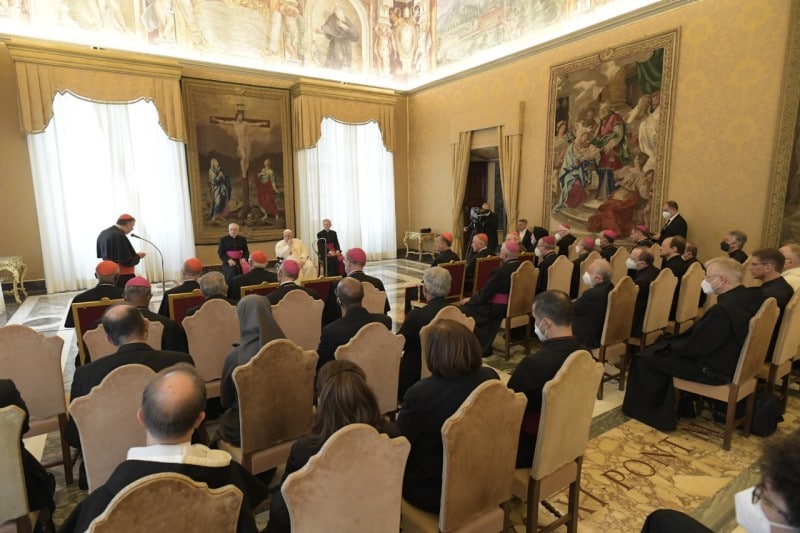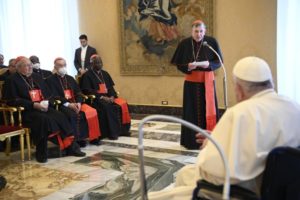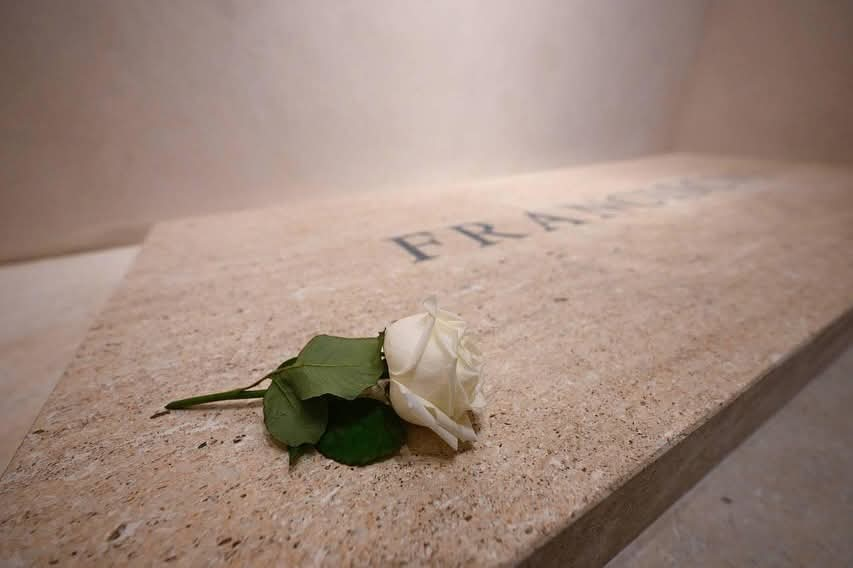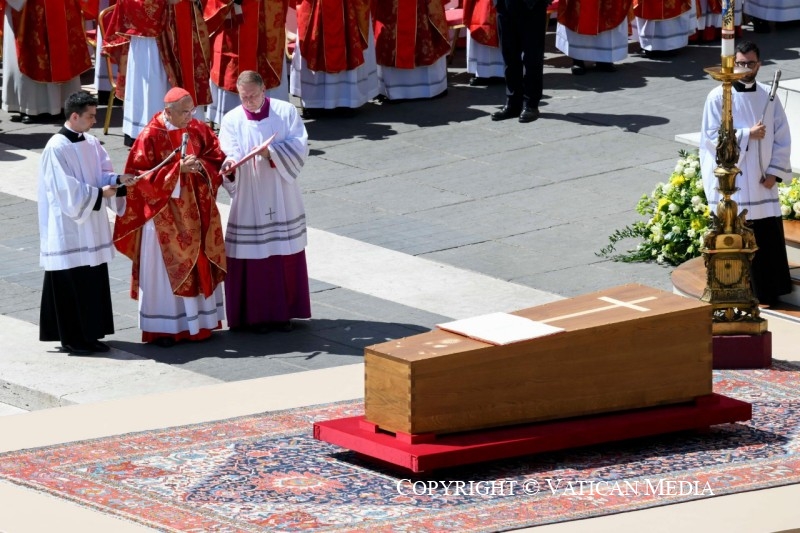Strengthen and renew relations among Christians
Adedress of his Holiness Pope Francis to participants at the Plenary of the Pontifical Council for Promoting Christian Unity

This morning, in the Vatican Apostolic Palace, the Holy Father Francis received in audience the participants at the plenary session of the Pontifical Council for Promoting Christian Unity and gave them the address that we publish below:
Address of His Holiness Pope Francis
Dear Cardinals,
Dear brother Bishops and Priests,
Dear brothers and sisters!
I greet you all heartily, and I thank Cardinal Koch for the words he addressed to me on behalf of you, members, consultors and collaborators of the Pontifical Council for Promoting Christian Unity.
Today concludes the Plenary Session of your Council, which it is finally possible to hold in person after having postponed it several times due to the pandemic. This, with its tragic impact on the social life of the entire world, has strongly conditioned even ecumenical activities, preventing the usual contacts and new projects over the last two years. At the same time, however, the healthcare crisis has also offered an opportunity to strengthen and renew relations among Christians.
A first significant ecumenical result of the pandemic has been a renewed awareness of belonging to one Christian family, an awareness rooted in the experience of sharing the same fragility and of being able to trust only in the help that comes from God. Paradoxically, the pandemic, which forced us to keep a distance from each other, has made us understand how close to each other we are in reality, and how we are responsible for each other. It is fundamental to continue to cultivate this awareness, and to give rise to initiatives that make explicit and nurture this spirit of fraternity. And on this issue, I would like to emphasize that today, for a Christian, it is not possible or practicable to go alone with one’s own denomination. Either we go together, all the fraternal denominations, or we do not go ahead at all. Today the awareness of ecumenism is such that one cannot think of journeying on the path of faith without the company of brothers and sisters from other Churches of ecclesial communities. And this is a great thing. Alone, never. We cannot do it. Indeed, it is easy to forget this profound truth. When it happens to Christian communities, it exposes us to the serious risk of the presumption of self-sufficiency and self-referentiality, which are grave obstacles to ecumenism. And we see this. In some countries there are certain egocentric revivals – so to speak – of certain Christian communities that either go backwards, or cannot advance. Today, either we all walk together or we do not walk. This awareness is a truth and a grace from God.
Even before the healthcare emergency had come to an end, the entire world found itself facing another tragic challenge: the war currently underway in Ukraine. Since the end of the second world war there has never been any lack of regional wars, many of them! Think of Rwanda, for example, thirty years ago, to mention just one; but think of Myanmar, let’s think… But since they are far away, we do not see them, whereas this one is close by and it makes us react. So much so that I have often spoken about a piecemeal third world war, scattered everywhere. However, this war, cruel and senseless like every war, has a greater dimension and threatens the entire world, and cannot but question the conscience of every Christian and every Church. We must ask ourselves: what have Churches done, and what can they do, to contribute to “the development of a global community of fraternity based on the practice of social friendship on the part of peoples and nations” (Encyclical Letter Fratelli tutti, 154)? It is a question we must think about together.
In the last century, the awareness that the scandal of the division of Christians had historic relevance in generating the evil that poisoned the world with grief and injustice had moved communities of believers, under the guidance of the Holy Spirit, to desire the unity for which the Lord prayed and gave his life. Today, faced with the barbarism of war, this longing for unity must once again be nurtured. Ignoring the divisions between Christians, out of habit or resignation, means tolerating that contamination of hearts that creates fertile ground for conflicts. The proclamation of the gospel of peace, that gospel that disarms hearts even before armies, will be more credible only if it is announced by Christians who are finally reconciled in Jesus, Prince of peace; Christians inspired by his message of universal love and fraternity, which transcends the boundaries of their own community and nation. Let us return to what I said: today, either we walk together or we stand still. We cannot walk alone. But not because it is modern, no: because the Holy Spirit has inspired this sense of ecumenism and brotherhood.
From this point of view, your reflection on how to celebrate the 1700th anniversary of the First Council of Nicaea, which will take place in 2025, makes a valuable contribution. Despite the troubled events of its preparation and above all the subsequent long period of reception, the first ecumenical Council was an event of reconciliation for the Church, which in a synodal way reaffirmed its unity around the profession of its faith. The style and the decisions of the Council of Nicaea should enlighten the current ecumenical journey and lead to practical steps towards the full reestablishment of Christian unity. Given that the 1700th anniversary of the first Council of Nicaea coincides with the Jubilee year, I hope that the celebration of the next Jubilee may have a relevant ecumenical dimension.
Since the first Ecumenical Council was a synodal act, and manifested synodality as a form of life and organization of the Christian community also at the level of the universal Church, I want to emphasize the invitation that your Council, together with the General Secretariat of the Synod of Bishops, has addressed to the Bishops’ Conferences, asking them to look for ways of listening, during the current synodal process of the Catholic Church, also the voices of brothers and sisters of other Confessions on issues that challenge faith and diakonia in today’s world. If we truly want to listen to the voice of the Spirit, we must not fail to hear what he has said and is saying to all those who have been born again “of water and the Spirit” (Jn 3: 5).

To go ahead, to walk together. It is true that theological work is very important, and we must reflect, but we cannot wait for theologians to agree before we embark on the path of unity. Once a great Orthodox theologian told me that he knew when theologians would be in agreement. When? The day after the final judgment, he said. But in the meantime? Journey as brothers, in prayer together, in works of charity, in the search for truth. Like brothers. And this brotherhood is for all of us.
Dear friends, I encourage you to continue in your demanding and important service, and I accompany you with my constant proximity and gratitude. I ask the Lord to bless you, and please, do not forget to pray for me.
Thank you.
Related

Cardinal Parolin at the Novendalia Mass: “Mercy leads us to the heart of faith”
Exaudi Staff
27 April, 2025
8 min

Pope Francis’ Tomb in Santa Maria Maggiore
Exaudi Staff
27 April, 2025
1 min

Mercy and the joy of the Gospel are two key concepts of Pope Francis
Exaudi Staff
26 April, 2025
9 min

Thousands of faithful bid farewell to Pope Francis in St. Peter’s Square
Exaudi Staff
26 April, 2025
2 min
 (EN)
(EN)
 (ES)
(ES)
 (IT)
(IT)

